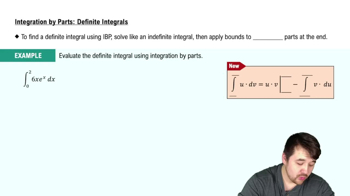Working with area functions Consider the function ƒ and its graph.
(b) Estimate the points (if any) at which A has a local maximum or minimum.
 Verified step by step guidance
Verified step by step guidance Verified video answer for a similar problem:
Verified video answer for a similar problem:



 6:11m
6:11mMaster Fundamental Theorem of Calculus Part 1 with a bite sized video explanation from Patrick
Start learning